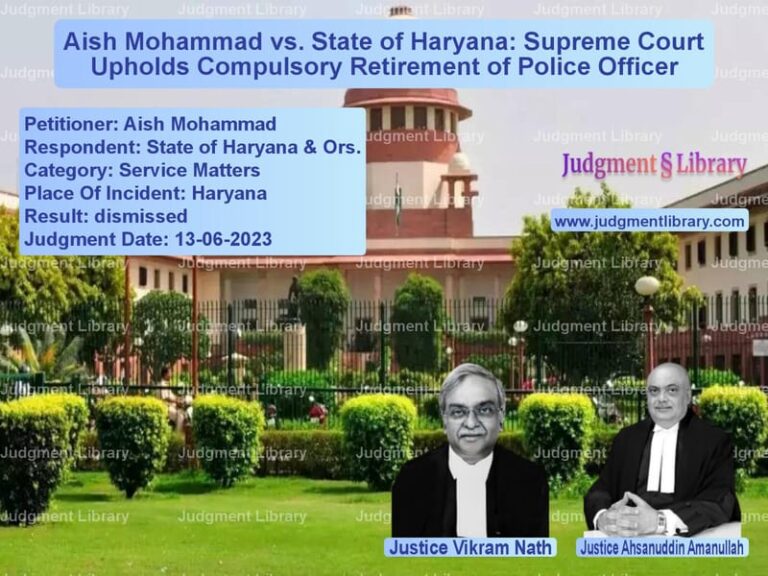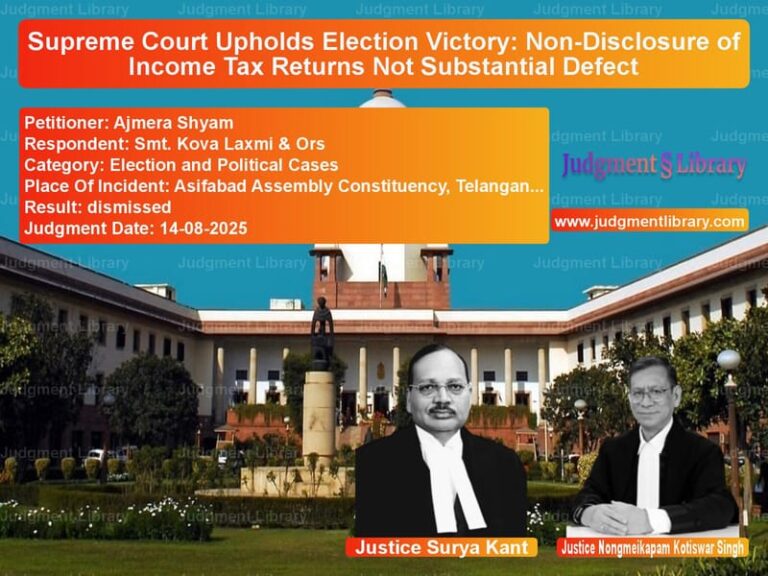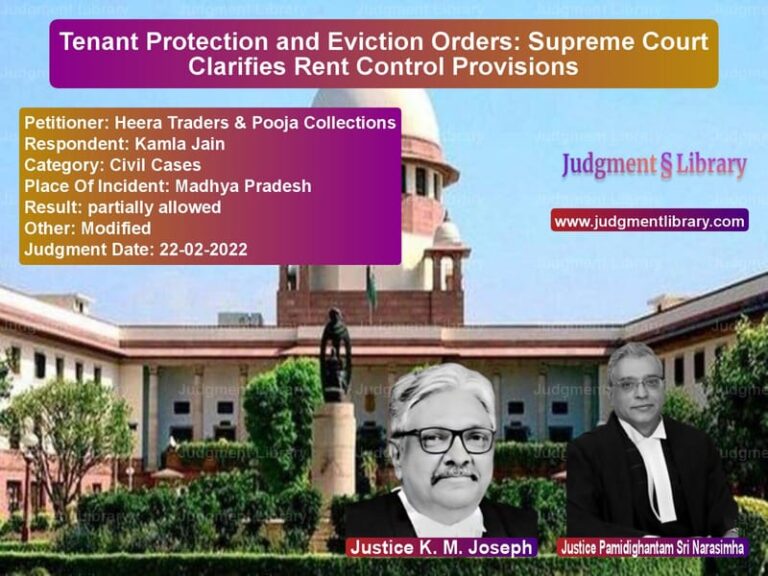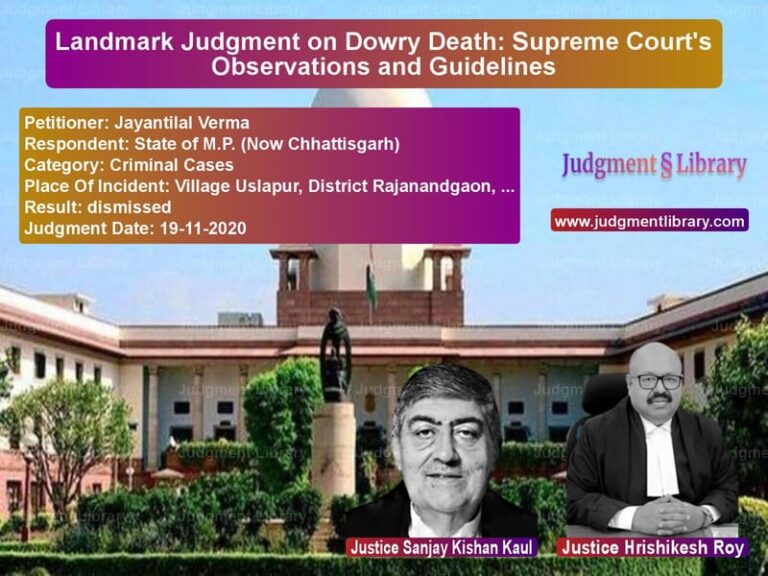Supreme Court Overturns Trial Court’s Rejection of Property Suit Under Benami Law
In a significant ruling, the Supreme Court of India overturned a decision by the Rajasthan High Court and the Trial Court, which had dismissed a property dispute case under Order VII Rule 11 of the Code of Civil Procedure (CPC). The case, Pawan Kumar vs. Babulal (Since Deceased) Through LRs & Ors., centered around a dispute over ownership rights to a shop in Kasba Fatehpur’s main market.
The ruling clarifies the application of the Benami Transactions (Prohibition) Act, 1988 (as it stood before the 2016 amendment) and reiterates that a suit cannot be dismissed at the outset without considering full evidence.
Background of the Case
The dispute arose when the appellant, Pawan Kumar, filed a suit for declaration of ownership and cancellation of a sale deed executed by his father in favor of the second defendant. The key claims in his plaint included:
- His father had been a tenant in the disputed shop.
- Due to his father’s old age, Pawan Kumar had been managing the business.
- A legal battle over possession had reached the Supreme Court, leading to a settlement where his father agreed to buy the property.
- Pawan Kumar arranged the funds for the purchase.
- However, the sale deed was registered in his father’s name instead of his own.
- His father acknowledged in a notarized document (March 14, 2002) that the property belonged to Pawan Kumar.
- Despite this, his father sold part of the shop to the second defendant.
Pawan Kumar filed a suit (Civil Suit No.126 of 2006) in the District Court of Sikar, seeking a declaration of ownership and cancellation of the sale deed.
Arguments by the Appellant (Pawan Kumar)
The appellant contended:
- The property was bought with his funds, even though it was registered in his father’s name.
- The transaction should be exempt from the Benami Transactions (Prohibition) Act, 1988, under Section 4(3), which allows property held by a person in a fiduciary capacity to be claimed by the real owner.
- The Trial Court had dismissed his suit prematurely without allowing him to present evidence.
Arguments by the Respondents
The respondents (defendants) countered:
- The property was legally owned by Pawan Kumar’s father.
- The claim was barred under Section 4 of the Benami Act, which prohibits suits by alleged real owners against persons in whose name property is held.
- The Trial Court and the High Court correctly dismissed the suit.
Trial Court and High Court Rulings
Trial Court Decision (2016): The Trial Court dismissed the suit under Order VII Rule 11 CPC, holding that it was barred under Section 4 of the Benami Act.
High Court Decision (2017): The Rajasthan High Court upheld the Trial Court’s ruling, stating that the appellant’s claim was prohibited under the Benami Act.
Supreme Court’s Observations and Ruling
The Supreme Court examined whether the suit was barred by the Benami Act and whether it should have been dismissed without a trial.
1. Benami Act Does Not Automatically Bar Claims Involving Fiduciary Relationships
The Court observed:
“The appellant’s case falls within Section 4(3) of the Benami Act, which allows claims where property is held in a fiduciary capacity.”
This meant the case should have been examined on merits rather than dismissed summarily.
2. Trial Court Should Have Allowed Evidence Before Dismissing Suit
The Supreme Court held:
“A suit cannot be dismissed at the threshold merely on the basis of pleadings. The question of whether the Benami Act applies should be decided after considering full evidence.”
3. Notarized Document as Prima Facie Evidence
The Court emphasized that the 2002 notarized document, where the father acknowledged Pawan Kumar as the real owner, needed examination:
“The document’s validity and implications should have been tested in trial rather than dismissed outright.”
Final Ruling
The Supreme Court allowed the appeal:
- The Trial Court’s rejection of the suit was set aside.
- The case was remanded for full trial.
- The Trial Court was directed to expedite proceedings and dispose of the suit within six months.
Implications of the Judgment
The ruling has significant implications for property law and the Benami Act:
- Clarifies Fiduciary Exceptions in the Benami Act: Property purchased in the name of a close relative does not automatically fall under the Act’s prohibition.
- Strengthens Right to Fair Trial: Courts must examine full evidence before dismissing property claims.
- Reinforces Notarized Documents in Property Disputes: Documents acknowledging real ownership must be given due consideration in property cases.
The Supreme Court’s decision in Pawan Kumar vs. Babulal ensures that individuals cannot be denied a fair hearing merely based on initial pleadings and that substantive justice prevails in property disputes.
Petitioner Name: Pawan Kumar.Respondent Name: Babulal (Since Deceased) Through LRs & Ors..Judgment By: Justice Uday Umesh Lalit, Justice Indu Malhotra.Place Of Incident: Rajasthan.Judgment Date: 02-04-2019.
Don’t miss out on the full details! Download the complete judgment in PDF format below and gain valuable insights instantly!
Download Judgment: Pawan Kumar vs Babulal (Since Decea Supreme Court of India Judgment Dated 02-04-2019.pdf
Direct Downlaod Judgment: Direct downlaod this Judgment
See all petitions in Property Disputes
See all petitions in Succession and Wills
See all petitions in Judgment by Uday Umesh Lalit
See all petitions in Judgment by Indu Malhotra
See all petitions in allowed
See all petitions in Remanded
See all petitions in supreme court of India judgments April 2019
See all petitions in 2019 judgments
See all posts in Civil Cases Category
See all allowed petitions in Civil Cases Category
See all Dismissed petitions in Civil Cases Category
See all partially allowed petitions in Civil Cases Category







